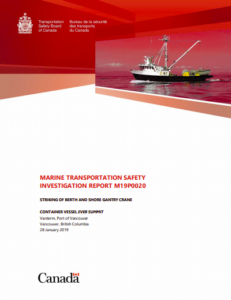The Transportation Safety Board of Canada (TSB) released its investigation report into the container vessel Ever Summit striking the berth at Vanterm, in the Port of Vancouver. The report highlighted a concern relating to larger container vessels berthing at the Port of Vancouver and the capacity of existing terminal infrastructure to accommodate them safely.
The incident
On 28 January 2019, the container vessel Ever Summit was berthing under the conduct of a pilot at Vanterm in the Port of Vancouver, British Columbia, with two tugs assisting, one positioned aft, the other forward.
During the manoeuvre, the vessel struck the berth and an adjacent shore gantry crane. The vessel, berth, and crane were damaged. There were no injuries or pollution.
Probable causes
The investigation found that the pilot’s and bridge team’s view of the tugs were obscured, and that the pilot was relying on his memory and mental model of the manoeuvre to keep track of the location and movements of the tugs.
Intending to move the bow of the vessel towards the berth by ordering the forward tug to push and the aft tug to pull, the tugs were inadvertently given opposite commands. As the tugs carried out the commands, the vessel’s stern rapidly moved towards the berth. Corrective action was ineffective, and the vessel’s stern struck the berth and crane, causing the crane’s boom to fall on the vessel.
- Over the last 10 years, there has been an increase in the size of container vessels berthing at Vanterm and no corresponding upgrades to the terminal.
- The vessel transited the berth approximately 10 m off, an approach which limited the time to respond to any deviations during the berthing manoeuvre.
- The pilot engaged the tugs in order to maintain the vessel parallel to the dock. Intending to have the forward tug push and the aft tug pull, he inadvertently gave the opposite commands.
- As the tugs carried out the commands, the vessel’s stern rapidly sheered towards the berth. Attempting to correct this, the pilot called for increased power on the tugs, but the sheer increased.
- The master and the bridge team were relying on the pilot to safely manoeuvre the vessel into the berth and were focused primarily on monitoring the vessel’s position and carrying out orders given by the pilot. As a result, they were not monitoring the pilot’s commands to the tugs and were not in a position to help identify the deteriorating situation.
If bridge teams do not maintain effective bridge resource management, including monitoring communications between pilots and tug masters, there is a risk that errors will go undetected.
- Corrective action using the vessel’s engine, rudder, and thruster had insufficient effect, and the vessel’s stern struck the dock at an angle of 10° with the berth line and a speed of approximately 0.4 knots.
- The vessel’s large overhang and the proximity of the crane to the berth line resulted in the vessel’s hull striking the berth and the crane, which caused the crane’s gantry bogies to collapse and the boom to fall onto the vessel.
The investigation also found that procedures for tug use are largely left to the discretion of individual pilots, and that no standard communication protocols were in place at the time of the occurrence.
If standardized communications are not used, errors in tug commands will continue to occur, increasing the risk of accidents.
Watch: Port of Vancouver progresses with expansion project
Actions taken
Following the occurrence, the British Columbia Coast Pilots Ltd. developed standard operating procedures regarding tug communications during berthing and unberthing operations.
Meanwhile, the Port of Vancouver and the operator of Vanterm reviewed their crane storage practices for arriving and departing container vessels.
Safety concern:
-Impact of the growth of container vessel size on the safety of berthing operations
Over the past 10 years, there has been a substantial increase in the size of container vessels worldwide, including those calling at the Port of Vancouver. Without upgrades to existing infrastructure, these larger vessels necessitate berthing manoeuvres that have very little tolerance for error.
While all terminals are designed to accommodate a maximum vessel size and most have built-in safety margins, there are currently no requirements for Transport Canada or a port authority to examine the suitability of a berth for larger vessels. Decisions as to maximum vessel size are left to the discretion of the individual terminals.
As the size of container vessels calling at the Port of Vancouver continues to increase and, given the absence of any oversight as to the suitability of the berths by Transport Canada or the Vancouver Fraser Port Authority, the Board is concerned that the size of vessels may exceed the Port of Vancouver’s terminal infrastructure capacity to accommodate them safely.
Explore more herebelow:































































